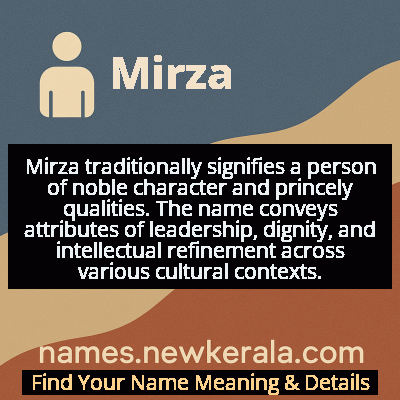Mirza Name Meaning & Details
Origin, Popularity, Numerology Analysis & Name Meaning of Mirza
Discover the origin, meaning, and cultural significance of the name MIRZA. Delve into its historical roots and explore the lasting impact it has had on communities and traditions.
Name
Mirza
Gender
Male
Origin
Unknown
Lucky Number
4
Meaning of the Name - Mirza
Mirza traditionally signifies a person of noble character and princely qualities. The name conveys attributes of leadership, dignity, and intellectual refinement across various cultural contexts.
Mirza - Complete Numerology Analysis
Your Numerology Number
Based on Pythagorean Numerology System
Ruling Planet
Uranus (Rahu)
Positive Nature
Strong sense of order, loyal, practical, and disciplined.
Negative Traits
Stubborn, overly serious, rigid, and prone to feeling restricted.
Lucky Colours
Blue, gray.
Lucky Days
Saturday.
Lucky Stones
Blue sapphire.
Harmony Numbers
1, 7, 8.
Best Suited Professions
Managers, engineers, accountants, organizers.
What People Like About You
Dependability, discipline, practicality.
Famous People Named Mirza
Mirza Ghalib
Poet
Revolutionized Urdu and Persian poetry with his profound philosophical verses
Mirza Asadullah Baig Khan
Scholar
Influential Mughal-era literary figure and master of ghazal poetry
Mirza Tahir Ahmad
Religious Leader
Led global Ahmadiyya Muslim community and established numerous educational institutions
Mirza Koochak Khan
Revolutionary
Pioneered socialist-Islamic movement in early 20th century Persia
Name Variations & International Equivalents
Click on blue names to explore their detailed meanings. Gray names with will be available soon.
Cultural & Historical Significance
Extended Personality Analysis
People named Mirza often exhibit characteristics associated with leadership, intellect, and cultural sophistication. They tend to be natural leaders who command respect through their knowledge and dignified demeanor rather than authority alone. Typically well-educated and articulate, Mirzas often excel in fields requiring communication skills and intellectual depth. Their personality often blends traditional values with modern adaptability, making them effective in bridging generational and cultural gaps. Many display a strong sense of honor and responsibility toward family and community, often taking on roles as cultural ambassadors or community organizers. The historical weight of the name seems to inspire high personal standards and a drive for achievement that benefits both individual success and collective welfare. While ambitious, Mirzas typically balance their aspirations with ethical considerations and social consciousness.
Modern Usage & Popularity
In contemporary usage, Mirza maintains its prestige while adapting to global contexts. The name remains popular in Muslim-majority countries and diaspora communities, particularly in Pakistan, India, Bangladesh, Iran, Turkey, and Central Asian nations. Its usage has expanded beyond traditional aristocratic families to become accessible to broader populations while retaining its dignified connotations. Modern Mirzas often excel in diverse fields including technology, medicine, business, and arts, bringing the name's historical association with excellence into contemporary achievements. The name's popularity has remained stable rather than trending, preserving its distinctive character. In Western countries, Mirza serves as a strong cultural identifier for children of immigrant families, connecting them to their heritage while functioning effectively in multicultural environments. The name's versatility as both first name and surname contributes to its enduring appeal across generations.
Symbolic & Spiritual Meanings
Symbolically, Mirza represents the ideal of 'nobility through character' rather than mere birthright. It embodies the concept that true leadership comes from wisdom, integrity, and service to others. The name symbolizes cultural continuity—the passing of valued traditions and knowledge from one generation to the next while adapting to contemporary realities. Mirza also represents the bridge between Eastern and Western cultures, embodying the ability to honor one's heritage while engaging with global modernity. In a metaphorical sense, the name suggests someone who carries the 'royal responsibility' of maintaining family honor, community welfare, and cultural preservation. The symbolic meaning extends to intellectual royalty, emphasizing that the highest form of nobility comes through knowledge, creativity, and contribution to human understanding.

